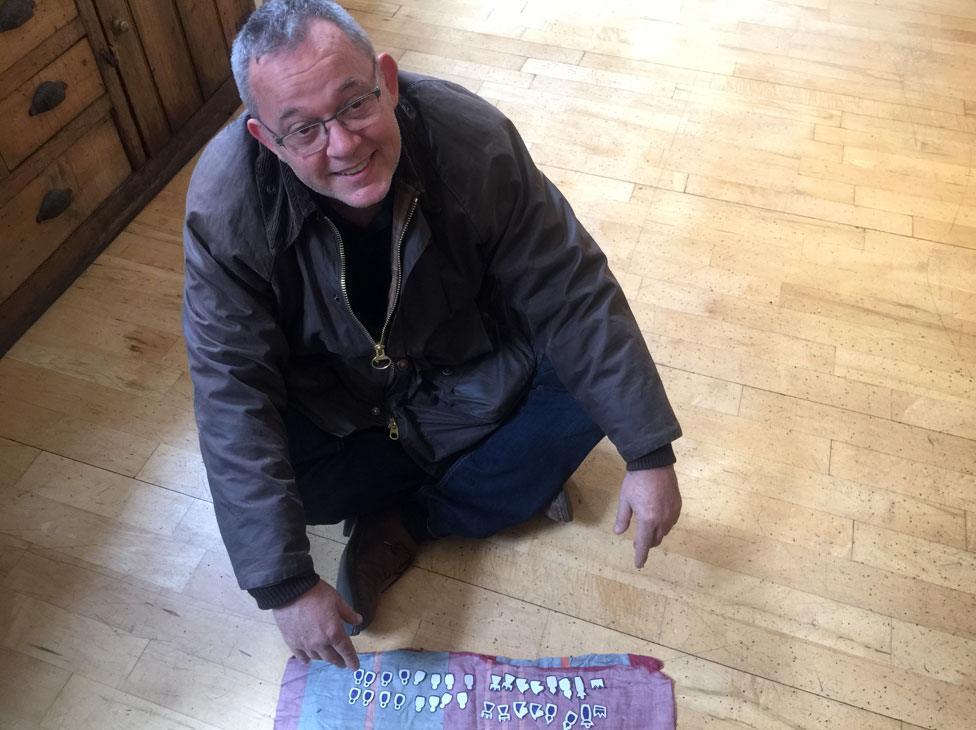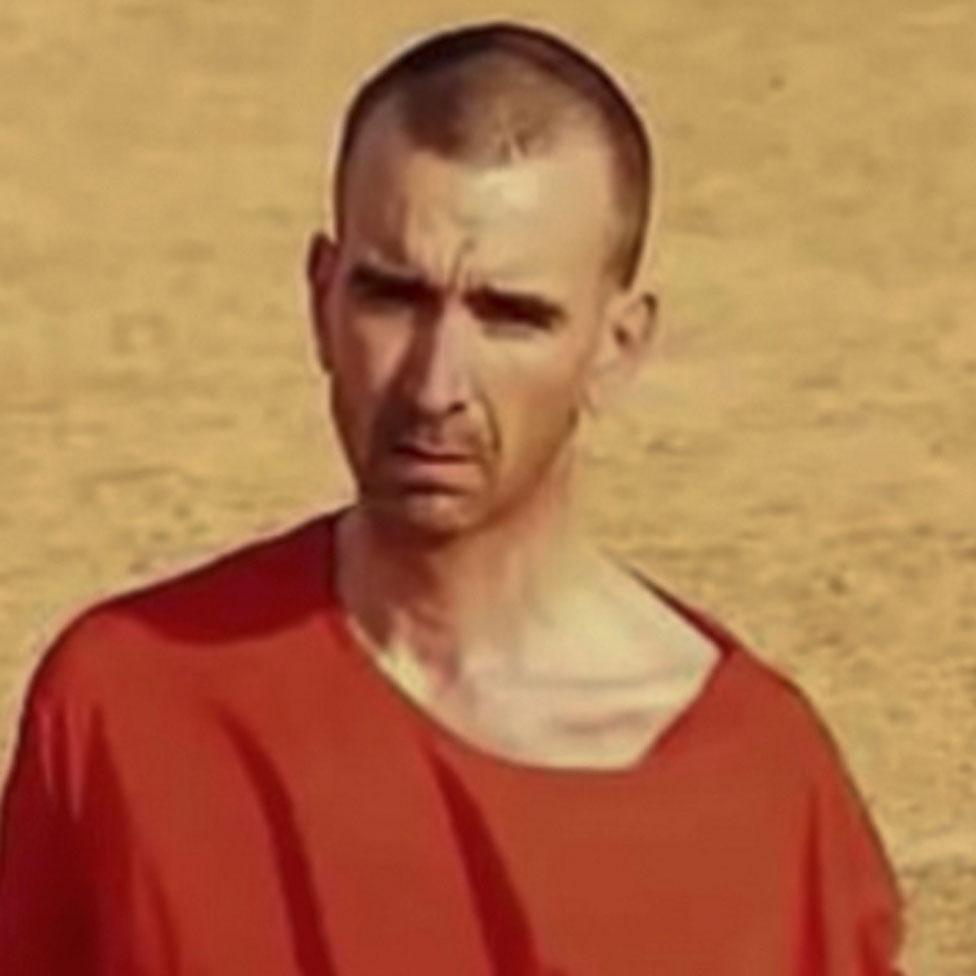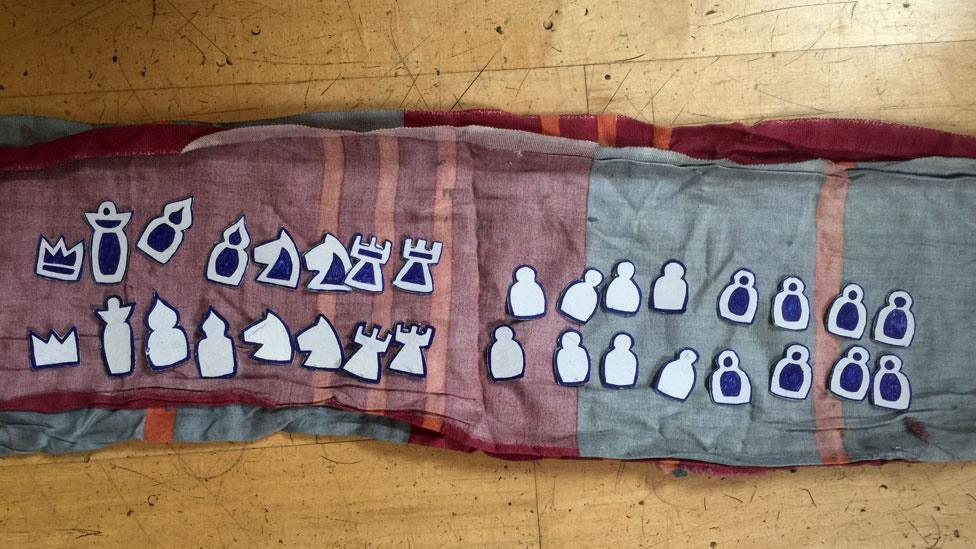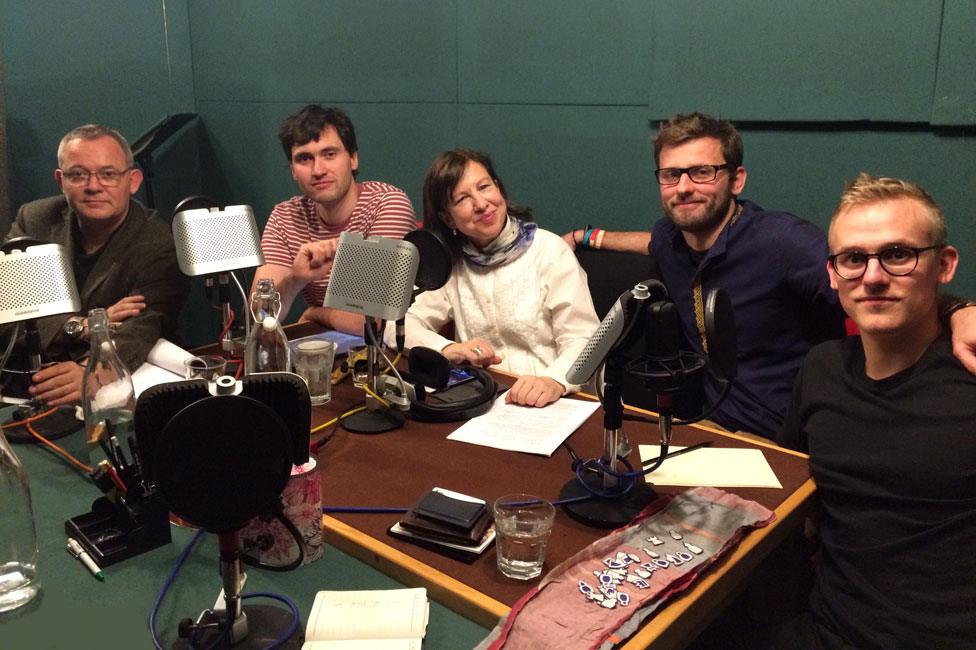How four men survived as hostages of IS
- Published

Hostages Federico Motka, Daniel Rye Ottosen, Pierre Torres and Didier Francois
In his classic novel 1984, George Orwell writes about Room 101 - a torture chamber where you are subjected to your worst nightmare, the worst thing in the world, to break your resistance.
To survive any such place of profound pain is the greatest of gifts, a triumph of the human spirit. In our time, surviving brutal captivity at the hands of so-called Islamic State in Syria must certainly count as such a triumph.
When four former hostages came together this month for their first reunion since they were freed, at different times, two years ago, it was a celebration of friendship forged in the most threatening of circumstances, a remembrance of an agonising ordeal.
In the BBC radio programme Held Hostage in Syria they recall months without sunlight, weeks chained together, days upon days of beatings. There was too little food, and so much longing for clean clothes, a proper toilet, and most of all, freedom.
But it was also an affirmation of extraordinary resilience. They had all won what they call a "game of survival" which lasted about one long terrible year of torment for all of them.

Find out more
Listen to BBC Radio 4's Held Hostage in Syria on the BBC iPlayer
Listen to a longer programme for the BBC World Service on Saturday 11 June
The transcript below is an edited version of the Radio 4 programme

They played this game in their own individual ways to preserve themselves, and some semblance of human dignity. Federico Motka, an Italian aid worker, lowered his gaze and raised his guard to avoid his captors' efforts to demean him. French war correspondent Didier Francois pushed back and stared them straight in the eye. Danish photographer Daniel Rye Ottosen, an elite gymnast, did the splits to convince them he was not a spy. French blogger Pierre Torres took beatings, but satisfaction, from ignoring their orders.
And they played this game together, helping each other endure their ordeal, as IS guards of different nationalities deployed diverse tactics of physical and psychological torture to try to break them. Only one, Daniel Rye, was subjected to such brutality that he tried to take his own life - but the guards stopped him, and his fellow hostages brought him back to health.
There were real games too: chess, with pieces fashioned from cheese cartons with nail clippers; draughts (checkers), with the seeds of olives and dates; a self-styled lecture series on everything from carp fishing, to sailing, and how to dive into a small pool. This is how they escaped in their mind.

At one point in 2013-2014 19 men carrying a Western or a Russian passport were held hostage together in one small room. An adjacent room was a cell for five women. One by one, they have been freed for ransom or executed. Of this group of male hostages only one, British journalist John Cantlie, is left and one woman whose name has not been made public.

The 19 hostages
Federico Motka, 33, Italian aid worker - captured March 2013, released May 2014
Daniel Rye Ottosen, 26, Danish photographer - captured May 2013, released June 2014
Pierre Torres, 31, French blogger - captured June 2013, released April 2014
Didier Francois, 55, French journalist - captured June 2013, released April 2014
Six of the men held with them were beheaded by IS - James Foley, Sergey Gorbunov, David Haines, Alan Henning, Peter Kassig and Steven Sotloff
Eight were released - Edouard Elias, Javier Espinosa, Nicolas Henin, Marc Marginedas, Ricardo Vilanova, Toni Neukirch and two un-named aid workers
One remains in captivity - the British journalist, John Cantlie
Of five women held captive separately at the same time, aid worker Kayla Mueller was killed, three were released and one remains in captivity
No-one was released without the payment of a ransom

Several journalists and aid workers, and hundreds of Syrians, have not lived to tell of their ordeal. We know of their fate from grotesque videos on social media which have brought a sickening cinematic slickness to medieval beheadings.
These are the stories of four men who went to Syria to report on a punishing war, or to try to ease suffering in this humanitarian crisis of our time. They all went to help in some way. They all found themselves in a living hell.
In our studio, they return to the dark, dreadful rooms they escaped two years ago. At moments they struggle to find the right words. At moments, they still can't draw them out. There's deep sorrow, but also smiles. "When we meet," reflects Didier Francois, "we can share things that we can't share with anyone else… it's important."
What they can share with us is a compelling chronicle of our time.
CAPTURE
DIDIER: The way it happened was very fast. I crossed the border in the morning, around 10:30am, and by 11am I was caught. As soon as you crossed from Turkey into Syria, the trap was already closing in. There was one car behind us and another in front, five guys came out and it was all very professional. There was no way to escape. They took our glasses off, they took our shoes off so we couldn't run away, we were blindfolded and they took our phones away. After this, you put yourself in survival mode immediately.
PIERRE: I graduated as an oceanographer, but in 2011 I was captivated with the Arab Spring. I was very interested in the city of Raqqa. It's now the self-declared capital of the Islamic State, but at that time, it was the first capital freed from the Assad regime… On the day I got caught, I was just two minutes from my friend's house, where I was staying. A car stopped to the left of me and four or five people were in it wearing ski masks. But at that time in Raqqa, that wasn't a scary sight. It was normal to see people in a car wearing ski masks in the middle of the afternoon. I just thought, "Oh maybe they're just going to ask me what the time is." But then I saw the barrels of the pistols they were holding and realised it was something else. They started to punch me like hell from everywhere with the guns and the barrels of the guns. At one point I began to collapse and I saw that the top of the car was covered in blood. I then realised that the blood was coming from my head.
FEDERICO: I was with David Haines [the British aid worker] in the car. We had just spent the day talking to community groups. We went to Atma camp just on the border and then we got back in the car and started driving to our safe house. I was actually on the phone with my boss at the time and didn't notice anything until there were suddenly two black cars around us. One in front and one behind. About eight fighters piled out of it and there was a lot of shouting. I just dropped my phone on to the seat next to me - which still had my boss on the other end of the line. In a blur, you just get pulled out of the car and put down on the floor. I remember there was a man on a bike just cycling past with a look on his face that just said, "Oh crap." Then we were put into the boot of a car - but it didn't close properly so they took us out and put us back in again. Then we just sped off.

David Haines, seen in an IS propaganda video at the time of the beheading of US journalist Steven Sotloff in September 2014
GUARDS
DANIEL: The guard said to me "Daniel, why do you have such wide shoulders? You look like a guy from the army or something." And I said, "No, no, I'm not. I'm a former elite gymnast. That's why I look the way I do." And he replied, "But that's why some of the other guards think that you're a spy." That was when I first got really scared. I tried to show him that I wasn't a spy, and that I really was a gymnast by doing the splits there and then on the mattress. And this guy was saying, "Stop doing that. I'm supposed to interrogate you. I'm supposed to torture you." Then some other guys came down and they started to yell at me, shout at me and punch me. Many of the foreign fighters - the European or Western fighters that came - tended to be a bit more aggressive towards us. At some point, I remember they came in and they took me up, and I had to dance some kind of tango. That was really strange because you really felt like you were humiliated.
DIDIER: The difficult thing when you lose your freedom is that there are no rules. You are outside the rule of law. The guards are the ones who make the decisions and you've lost all your control. So the only thing you can keep for yourself is your dignity. You have to understand that they all had one objective - to keep us under their thumb. There were no nice guards or good guards - all of them were bad. But their strategies to control us as a group were different. Some resorted to extreme violence and others used more sophisticated tactics. The French guards were more into playing games with our minds, while the British were more into a direct approach - control and violence. And we never knew which method would be used. They came on a regular basis to beat you up with no reason, to show you that they are in charge. They put some pepper spray on my blindfold. There was no water and no food for four days.
PIERRE: I had a massive guilt complex at one stage and it was bothering me all the time. I actually felt like I had accepted some things too easily and I wanted to be able to fight and struggle. So at one stage, I targeted a very young guard - I think he was from Tunisia. I stood in front of him and made direct eye contact. Those guards were so sensitive to body language and eye contact. So I stood in front of him very proud, and with my eyes I was saying, "You're a piece of shit."… Then at one stage, that guard wanted to punch me. He came up to me holding a stick, and he tried to take me down with it, but I stood up. A few minutes later, he came back and he was so angry. He was really out of control. He took me away from the jail where I was and beat the crap out of me with the stick. Then he took me back to the cell with the others, and I was suffering a lot all over my body. He'd also punched me in the stomach so I had shit on my pants. But I was euphoric. It was like taking cocaine or something. I was feeling so great. I loved that moment and really appreciated it. It was worth it.
STAYING ALIVE
DANIEL: I tried to focus on all the bright things in my situation. I started counting a lot, talking to myself, and started making up projects in my head. I think the survival mode that you go into when you're by yourself is very interesting. It's really, really difficult. You're just there with your brain, and yourself. I could have good times when I thought everything seemed fine, and I could have bad times. When I look back now, I had different states of mind. I had the shock at the beginning. The second part was about accepting and adapting. The third part was thinking that this was my everyday life. This is when you become a good hostage. And for me, this is actually when the time started to go by faster. There was a point when I thought, "I will not survive." I tried to escape and I tried to hang myself and I was rescued by the bad guys. They came in and they took me down and everything was OK, and I really felt that they would not kill me. But my point is that I went through that and suddenly I came to a new sense of self where the situation was completely different.
FEDERICO: We were split up, me and Dave [David Haines]. Dave had given me three pieces of advice which I will never forget: always tell the truth; if we get split up make a routine; and play the game. They took me out and drove me off to another place, just a completely black cell with a toilet, and for about three weeks - nothing. Days and days of solitude. I would pace up and down and do these things like chatting to my parents and my sister in my head and try to sleep again. Anything to pass the days. We only really became a group with the other hostages much later on, at the end of July. Our only ability to keep dignity was to try to keep as clean as you could. But we were going through a routine of having our hands cuffed behind our back at night and our hands cuffed in front during the day. On some occasions when they told us that we smelt too bad, the handcuffs would be taken off so we could take our T-shirts off and wash our armpits with a little bit of water. That was for me the way to maintain dignity… I'd been wearing the same clothes that I'd had on that afternoon that we got caught up right until July - even longer than that actually. I just took every opportunity whenever I went to the toilet to wash them in water. It was my obsession.
ENTERTAINMENT
DIDIER: This cloth is a cotton scarf in which I had hidden some chess pieces, made from Vache Qui Rit cheese boxes. We played chess a lot.

PIERRE: We organised lectures, we organised sport and we organised games.
FEDERICO: We used blankets to make a boat on the ground and I then tried to explain with my very limited physics how sails work and boats go faster. Alan Henning gave a lecture on carp fishing I think.
[Pierre gave a lecture on how to make iron. Daniel gave a lecture on diving from a high board into a small pool.]
DANIEL: I remember my brain was thirsty. It wanted any information no matter what it was, as long as it was somebody talking about something from the real world.
FEDERICO: There was another game that we did that was really great - we did versions of Werewolf, also called Mafia. Whoever was narrating created the plot and then handed out characters and then people had to behave in that way. We had prima donnas and a prostitute at one point.
FOOD
DIDIER: We were obsessed with food - that was a long part of every discussion. Every night we tried to imagine a menu with the "non-dessert of the day". So it was the non-menu and a non-dessert that we would never get. When I got out, the first meal given to me was from the French intelligence team who were part of the army. It was when I was on the military plane, they opened the cans of cassoulet with beers. That was great.
DANIEL: I think the whole time the hostages and I were sitting inside together, we shared the same dream of crossing the border together. That wherever we were, we would go to a hotel together and there would be a buffet. We spoke a lot about that buffet, and how 19 guys would sit around the table and share it together. A day that should be a very happy day; crossing the border, going into freedom and going back to our families. And there was still some part of me staying behind in Syria saying, "It's only the end when all of us can sit around this table and eat our buffet."

Didier, Pierre, Lyse Doucet, Federico Motka and Daniel Rye Ottosen in the studio
BONDING
DIDIER: I think among all the hostages, we still have a strong bond. You can't live what we went through without keeping something. Even the bad parts of it. When we meet we share things that you cannot share with anyone else. It's very important.
PIERRE: Some of us were coming out of really tough experiences, we all had difficulties and we were all such different characters, but we really teamed up with each other. We built up something very strong between us.
RELEASE
FEDERICO: I had received a proof-of-life question - the colour of the bedroom wall in my mum's house is orange. It was one of the most bittersweet moments of my life. Up until then I had to believe that David [Haines] and I would be released together and that was the moment that I realised it wasn't happening and I cried like a baby. Dave was sitting next to me and he hugged me and everyone was really nice. They said, "Take this chance." David knew by then that things weren't looking great. My proof of life meant his loss of a certain level of hope.
[David Haines was beheaded in September 2014, four months after Federico was released.]
DANIEL: When I was released, we were eight guys left - me and a German guy, and three Brits and three Americans. I got my proof of life, then the German guy got his proof of life a few days later. At that point it was very clear that they were not negotiating for the Americans and the Brits. The day that I was released, I was sitting in a corner and I was crying, early in the morning, all by myself just with a blanket over my head not to show the other guys that I was nervous. And then James [Foley] came over to me, put his arm over my shoulders and said, "Don't worry, they will probably come in 10 or 15 minutes, and you will be on your way home, and just enjoy it. You really earned your freedom."
Subscribe to the BBC News Magazine's email newsletter to get articles sent to your inbox.